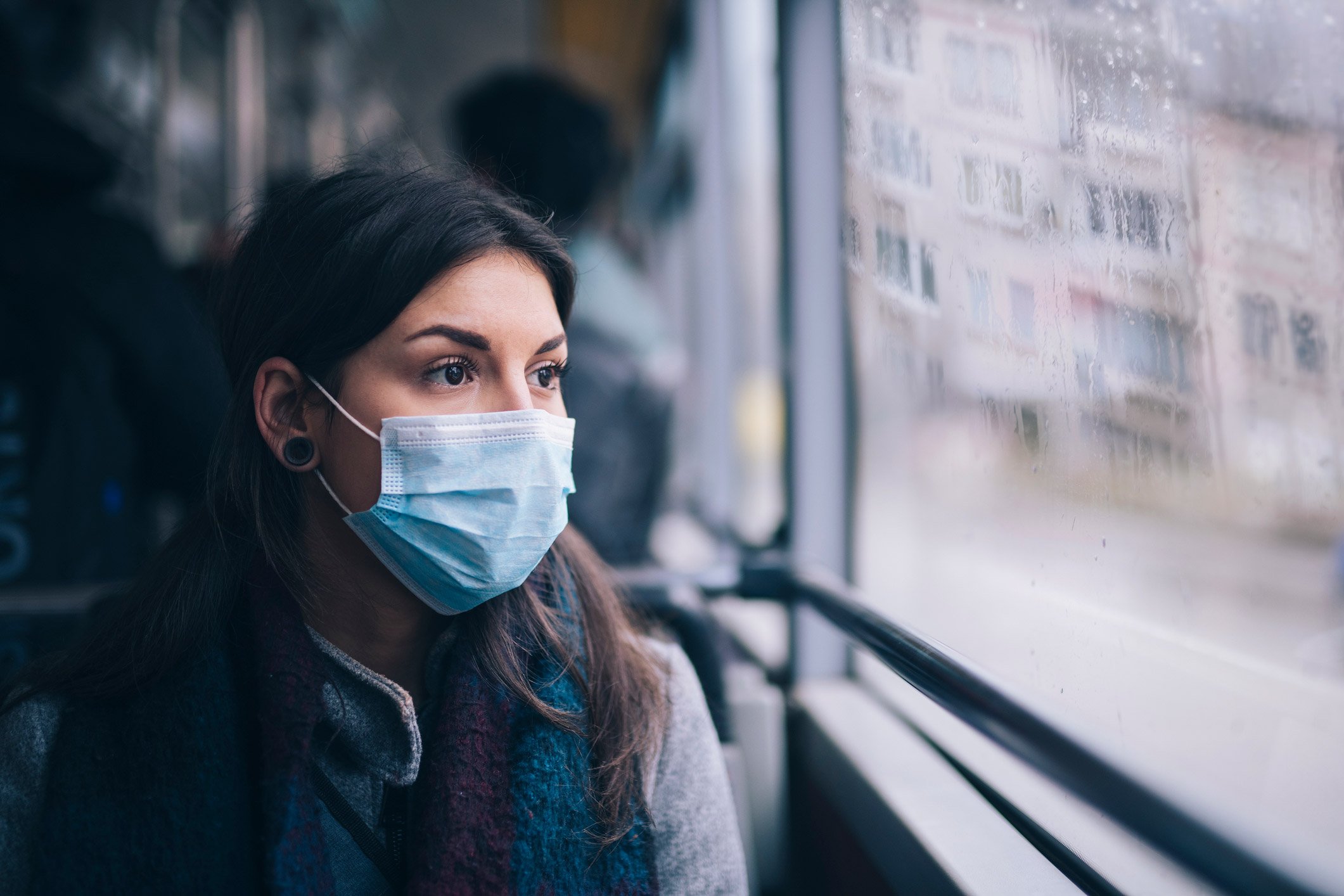Every day, we’re learning more about the SARS-CoV0-2 virus (popularly known as “the coronavirus”), which causes COVID-19. Public health experts are learning how to slow its spread. Medical researchers are working diligently to develop effective treatments. And all of us are learning how to wash our hands for 20 seconds, how to stay healthy, how to find connection in times of social distancing, how to scrounge for toilet paper, and how to cope with a world that has changed in profound ways.
Much of the media coverage of the coronavirus pandemic focuses on prevention through avoidance. We’re told to distance ourselves from others, wash or disinfect our hands frequently, avoid touching shared objects, and even stay in our homes for weeks or months at a time. That advice is critically important.
But it’s not all that we can do.
We Still Have a Lot to Learn
Our understanding of the facts is constantly changing as new information comes out. But as of this writing, about one in six people who get infected experience severe symptoms like difficulty breathing — resulting in hospitalization. And the sheer number of people in this group is placing an overwhelming burden on our healthcare system. Yet some people, perhaps even most, get what feels more like a flu. And some, it turns out, aren’t even aware that they’ve gotten a coronavirus, staying healthy and symptom-free. However, even asymptomatic people can spread it to others for whom it could become life-threatening. But the question remains: Why doesn’t SARS-CoV-2 impact everyone in the same way?
We still have much to learn about this. But we do know that your underlying level of health has a profound impact on how your body responds to any infection. We also know that obesity, asthma, heart disease, high blood pressure, type 2 diabetes, and other chronic illnesses are all considered risk factors for the most serious COVID-19 outcomes. And these diseases are all profoundly impacted by your diet and lifestyle. And we also know that a healthy and optimally functioning immune system is a critical line of defense against viruses of all kinds, including SARS-CoV-2.
What is Coronavirus?
Coronavirus doesn’t actually refer to just one virus. Coronaviruses are a large family of viruses that may cause illness in both animals and humans, often leading to respiratory illness that may become severe.
SARS-CoV-2 is the particular strain of coronavirus that causes the current COVID-19 illness.
Where did this strain of coronavirus come from? As of this writing, the mystery of its root cause has yet to be conclusively solved. But most leading researchers believe that it was transmitted from animals to humans through human consumption of meat. Specifically, this strain may have originally come from people eating Malayan pangolins, animals often smuggled into China for their scales and meat, or through bats, both traditionally available at the Huanan “wet market” in Wuhan, China.
This form of transmission — called zoonoses — is actually extremely common. About three-quarters of all infectious diseases in humans jumped to our species from another one, including the common cold (horses), leprosy (water buffalo), chickenpox, bird flu, typhoid fever and shingles (chickens), whooping cough (pigs), influenza (ducks), as well as measles, smallpox, and tuberculosis (cattle).
How to Avoid Exposure to Coronavirus

The best way to avoid getting sick, whether from coronavirus or any other infectious disease, is to avoid the germ in the first place. Below are some of the best health and safety practices you can follow to minimize your exposure risk and prevent exposing others if you’re a carrier. You’ve probably heard most of this already, but it’s still worth stating because it’s profoundly important.
“Social distancing,” which I prefer to rebrand as physical distancing (since we can still have active social lives, without physical exposure), is the best way to prevent the spread of germs. Instead of a handshake, try a slight bow, a smile and a nod, or an air high five — a “sky five,” without touching. This distance is especially important if someone is coughing or sneezing, in which case you should maintain a distance of at least 10 feet (3 meters).
Pay Special Attention to Your Hands
You can be your own worst enemy when it comes to spreading germs. You can introduce viruses into your respiratory system simply by touching a doorknob, faucet, countertop, or towel that has the virus on it and then touching your face with that hand. Practice mindfulness about how you use your hands so that you can avoid touching your eyes, nose, mouth, or hair unless your hands are freshly washed or sterilized.
Avoid public spaces as much as possible, and if you must enter them, try to minimize touching “high traffic objects”: things that have a lot of public contact. Some examples of these include gasoline pumps, shopping carts, credit card machines, touch screens, door handles, light switches, and elevator buttons. When you have to touch these things, keep disposable gloves or paper towels with you that you can use as a barrier, and toss them after use. Clean and disinfect frequently touched objects and surfaces, using a regular household cleaning spray or wipe. In places like the grocery store, use the provided disposable wipes to clean your hands and the handle of the shopping cart.
To stay healthy, wash your hands many times throughout the day, especially before cooking, preparing food, or handling dishes. The proper way to wash your hands is to lather them with soap for at least 20 seconds. Soap, it turns out, is remarkably effective at breaking down and destroying SARS-CoV-2.
If washing with soap and water isn’t possible, then use an alcohol-based hand sanitizer with at least 60% alcohol. You might want to keep hand sanitizer outside your front door, too, so you can sterilize your hands when returning from an outing (thus helping to keep possible germs out of your home).
The best defense is a strong offense — keeping pathogens from ever getting into your body. But some may still reach you. And that’s why your immune system is so important.
Immune System 101

Your immune system is your body’s network of organs, tissues, and cells that work together to keep you healthy by fighting off harmful bacteria, viruses, parasites, and fungi. It acts as a barrier between your body and the things that can make you sick.
Your immune system can become compromised by dietary, environmental, and lifestyle factors. And a compromised immune system can lead to frequent illness — and more suffering whenever illness strikes.
Your complex and amazing defense system contains two main parts. First, you have mucous membranes found in places like your nose, eyes, and mouth — which use white blood cells to fight infections before they can get inside you. Second, you have T cells and B cells, which work together to create antibodies that fight off invaders and then destroy infected cells throughout your body.
Your bone marrow and spleen also play key roles, making white blood cells that fight infections. And your lymphatic system transports lymph (a fluid containing white blood cells) throughout your body.
Altogether, your immune system functions as an amazing team, working to keep you healthy, safe, and alive.
Smart Immunity to Stay Healthy
Some people talk about “boosting” your immune system, but that’s not necessarily a good idea. One of the most dangerous things that can happen to people infected with SARS-CoV-2 is called a cytokine storm (aka hypercytokinemia). This occurs when a healthy and vigorous immune system confronts the virus and releases a wide variety of inflammatory compounds, including cytokines. It’s basically an immune over-response that leads to death.
So what you really want is a smart immune system. One that can respond effectively to whatever comes your way and that can keep your body clean, healthy, and free of disease.
While there hasn’t been a lot of research on the foods and nutrients that are helpful with COVID-19 specifically, it stands to reason that the same foods that are good for overall immune function, and that are helpful against colds, cases of flu, and other viruses, are just as important now.
How Does Food Affect Your Immune System?
It’s difficult to overstate how important nutrition is in promoting a healthy immune system. You need a diverse group of phytochemicals (the bioactive chemical compounds in plants) to create a strong barrier against pathogens that would otherwise make you ill.
Because immunity typically declines as you age, it becomes especially important to eat more immune-supporting foods as you get older. Plus, there is considerable evidence that the immune systems of people who eat healthful diets abundant with fruits and vegetables do not decline nearly as rapidly with age.
Many studies have shown that nutrient deficiencies cause impaired immune function in the elderly. Even in people as young as 35 years old, poor nutrition wreaks havoc on the immune response.
But there’s good news, too! When elderly people eat at least five servings per day of fruits and vegetables, they have improved antibody response to stress.
Making healthy food choices is like recruiting a microscopic army of nutrients which are all trained to help your body fight off germs.
So, what foods should you be eating to get the nutrients you need and stay healthy?
G-BOMBS to the Rescue
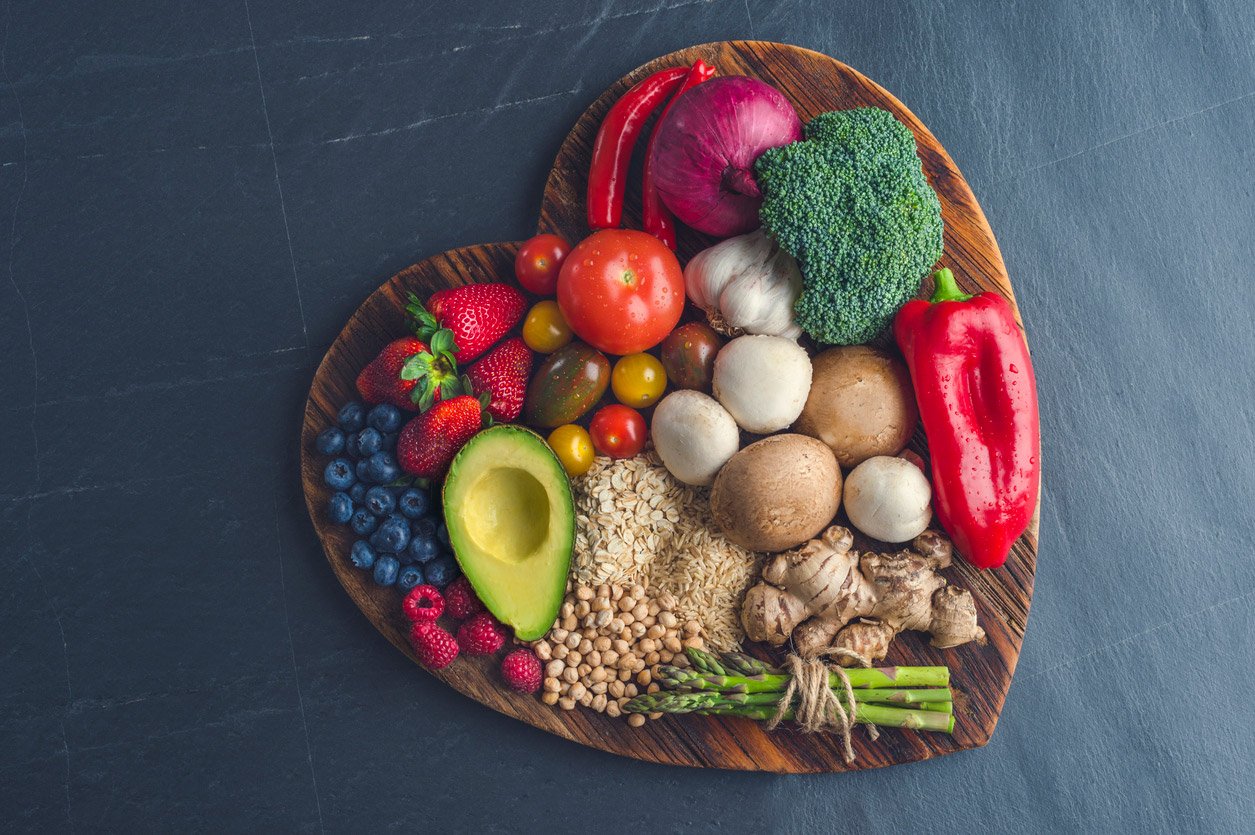
Some of the healthiest foods for you and your immune health are what’s called G-BOMBS, a fun acronym developed by Food Revolution Summit speaker, Joel Fuhrman, MD. It stands for Greens, Beans, Onions, Mushrooms, Berries, and Seeds. G-BOMBS are full of critical nutrients to help your body fight off illness.
Greens
Greens, such as spinach, kale, mustard greens, collard greens, broccoli, bok choy, and Brussels sprouts, are packed with the phytonutrients your immune system needs for optimal function. Green vegetables are rich in folate, calcium, and antioxidants like lutein and zeaxanthin. Folate is especially important for producing antibodies that work to destroy antigens that can make you sick. You can blend green veggies into smoothies, saute them, use them as a base for colorful salads, chop and mix them into pasta dishes, or roast them.
Beans
Beans, peas, and lentils are full of fiber and resistant starch (carbohydrates not broken down through digestion). The compounds in beans and other legumes can help enhance your gut microbiome, which is important because much of your immunity begins with the health of your digestive system. You can add beans, peas, and lentils to just about any dish, like spaghetti, on top of salads or pizzas, or in stews and soups.
Onions
Onions, which are part of the Allium family of vegetables along with shallots, scallions, leeks, garlic, and chives, are full of organosulfur compounds. These compounds have known benefits for immunity and are released when alliums are crushed or chopped. Onions contain quercetin, a compound that may have particularly powerful bacteria-fighting abilities, as well as prebiotic fiber that feeds only the beneficial bacteria in our large intestine. Onions and garlic make great kitchen staples because you can use them in so many ways. You might enjoy sauteeing them and adding them to soups, stir-fries, burritos, and homemade sauces.
Mushrooms
Mushrooms, including the commonly consumed varieties, like white, crimini, and Portobello, have been studied for their immune-modulating and enhancing abilities. There’s so much evidence that mushrooms are good for your immune system that they’ve even been studied as a potential treatment for cancer. Additionally, mushrooms may increase an important immune-balancing compound called secretory IgA.
Note that you should only eat cooked mushrooms to reduce a potentially carcinogenic compound called agaritine. Cooked mushrooms are great on warm sandwiches, in noodle dishes, on salads, in soups, and on pizza. They can even serve as a base for plant-based burgers!
Berries
Berries of all kinds, including strawberries, raspberries, blackberries, and blueberries, are high in phytochemicals and vitamins that may help keep the immune system functioning at its best. The main antioxidant compound in blueberries is called pterostilbene, which has been studied for its ability to lower inflammation and fight disease. Berries are delicious eaten raw, but you can also blend them into smoothies, mix them into oatmeal or yogurt, make them into a homemade chia jam, or toss them into salads.
Seeds
Seeds and nuts, like chia, flax, walnuts, and almonds, are rich in disease-preventing nutrients like fiber, healthy omega-3 fats, and micronutrients like vitamin E, iron, zinc, and calcium. Zinc — especially high in pumpkin seeds, sesame seeds, and hemp seeds — is a particularly potent nutrient that supports immunity, so much so that it’s called “a gatekeeper of immune function.” Nuts and seeds are a perfect afternoon snack and go well in homemade trail mix. You can blend them to make your own nut and seed butters and “cheezes,” or toss them into salads, stir-fries, and smoothies.
Other Immune-Supporting Foods
Stay healthy with a few other antioxidant-rich foods that strengthen immunity, including:
Beets: Beets are high in nitrates, which become nitric oxide in the body and open up your blood vessels, improving circulation and lowering heart rate. They also contain betalains, which can reduce inflammation, as well as fiber, an important nutrient to prevent a number of diseases.
Dragon Fruit: Dragon fruit is a good source of fiber and prebiotics, which are beneficial to gut health. They also contain antioxidants, like vitamin C, which enhance immunity. And they include heart-healthy compounds called flavonoids, like betalains.
Purple Veggies: Purple vegetables like purple cauliflower, purple carrots, red onion, eggplant, and purple cabbage, are loaded with antioxidants called anthocyanins, which give them their coloring and heal your cells from damage. Anthocyanins may help prevent cancer, promote heart health, and boost your memory.
Zucchini: Zucchini contains compounds that can improve digestion, slow the effects of aging, lower blood sugar, promote heart health, and protect your body against oxidative damage that can lead to disease.
What Nutrients Are Most Important for Immune Function?
Some of the most critical micronutrients for immune function include:
- Vitamin A, found in orange and yellow fruits and veggies like carrots, sweet potatoes, and pumpkin, as well as leafy greens
- Vitamin C, found in all plant foods, but especially oranges, bell peppers, broccoli, Brussels sprouts, melons, and strawberries
- Vitamin D, which is best obtained from the sun, but is also found in fish and algae. Some mushrooms contain a less bioavailable form called vitamin D2
- Vitamin E, highly concentrated in butternut squash, leafy greens, nuts, seeds, and broccoli
- B Vitamins, which you can get from citrus fruits, whole grains, beans, lentils, nuts and seeds, avocados, bananas, spinach, and broccoli
- Iron, rich in tofu, beans, lentils, cashews, dried fruit, chia seeds, pumpkin seeds, and chickpeas
- Zinc, of which excellent sources are oatmeal, tofu, cashews, sunflower seeds, peanuts, lentils, and chickpeas
- Selenium, the best plant source of which are Brazil nuts, which can provide more than 100% of your daily needs in just one nut
As you can see, eating a diet that includes a wide variety of whole plant foods, including legumes, whole grains, nuts, seeds, fruits, and veggies, is a great way to help your immune system stay healthy and in top shape.
Antioxidants and Coronavirus
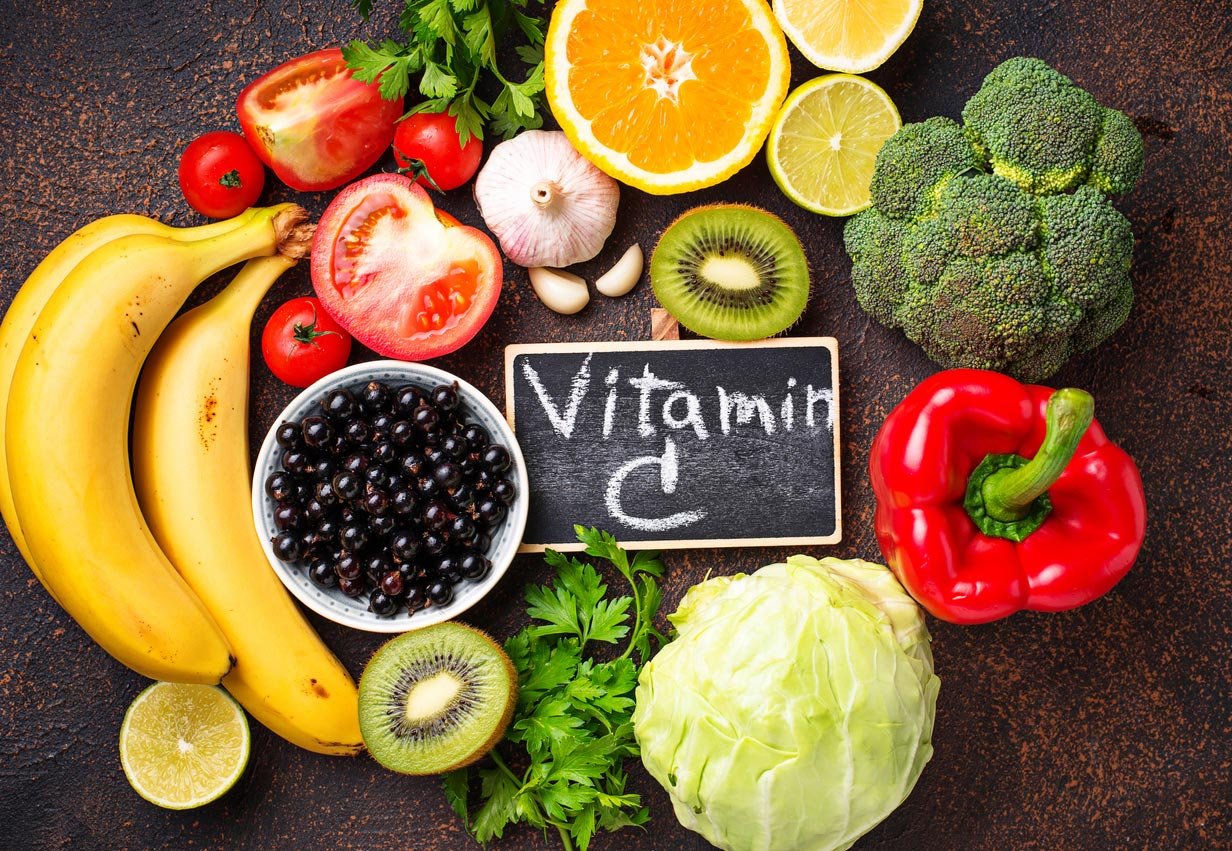
Many of the best foods to prevent getting sick, and that can help you recover if you do, are high in antioxidants. Antioxidants are compounds that help prevent oxidative damage to your cells that can ultimately lead to the development of disease.
One of the best antioxidants for fighting and preventing any virus, including potentially COVID-19, is vitamin C. We know that Vitamin C can reduce the inflammatory response, and may help prevent and shorten the duration of the common cold. We also know that it has been shown to regenerate other antioxidants.
There is a current clinical trial designed to test the efficiency of high-dose vitamin C therapy (delivered intravenously) in treating COVID-19 and secondary infections of pneumonia. As of this writing, results are still pending. Researchers are also looking to study oral liposomal vitamin C as a more easily consumed alternative to IV delivery.
Vitamin D for Immune Support
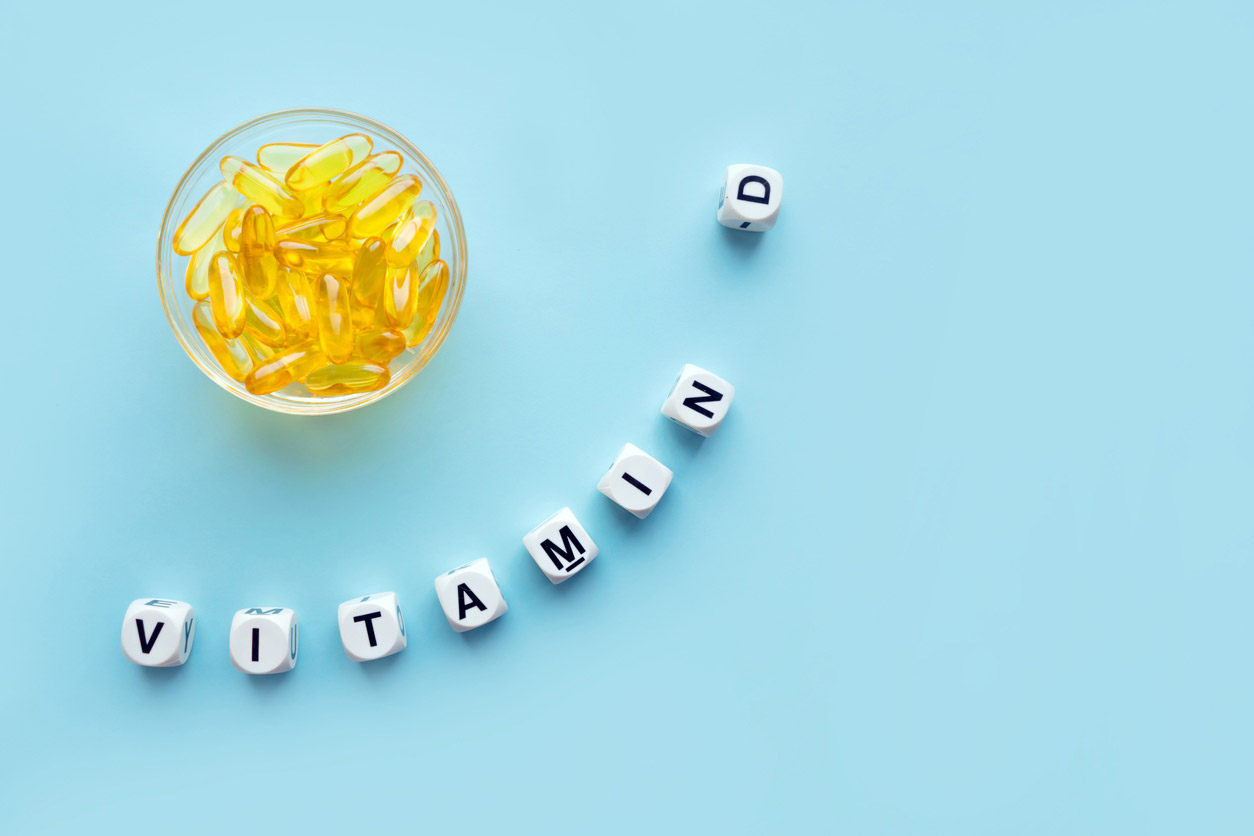
Vitamin D is another essential nutrient for immunity. A study published in the British Medical Journal in 2017 showed how people who had optimal vitamin D levels and who took vitamin D during the winter had lower rates of flu than people who received flu vaccines.
Studies have shown that people with vitamin D deficiency are 11 times more likely to get a cold or flu. While supplementing with vitamin D can reduce colds and flu by up to 42%.
While vitamin D — or “the sunshine vitamin” — is naturally made by your skin when exposed to direct ultraviolet light, most of us don’t experience enough direct sunlight year-round. In fact, one reason sickness, colds, and flu cases spike in winter is that during the winter months, most of us have less sun exposure and, correspondingly, lower vitamin D levels.
It’s a good idea to get your vitamin D levels tested using the 25-hydroxy vitamin D test. This is something almost any doctor can prescribe. You can also order a home test kit, such as this one, which might or might not be as reliable, but which adds a great deal of convenience.
Many health experts suggest that a healthy blood level of vitamin D is between 30 and 50 nanograms per milliliter — and ideally closer to 50. A daily dose of 2,000 IUs of vitamin D3 could make a huge difference, especially for people who don’t get a 20-30 minute daily dose of direct sunlight. Some find that 5,000 or even 10,000 IUs is the right amount to get to optimal blood levels. But remember that you can also get too much vitamin D, so supplementing with high levels is potentially ill-advised unless you are also testing to ensure you are in a healthy range.
You can also try a simple self-test for potential vitamin D deficiency at home. To do this, press your thumb into your sternum with medium pressure. Be sure not to press too hard, as to not damage your Xiphoid Process. If this medium pressure is painful or causes discomfort, you may have a vitamin D deficiency. If this is the case, you have even more reason to consider checking your blood levels or to simply take a modest daily supplemental dose.
Herbs, Spices, and Beverages for Prevention
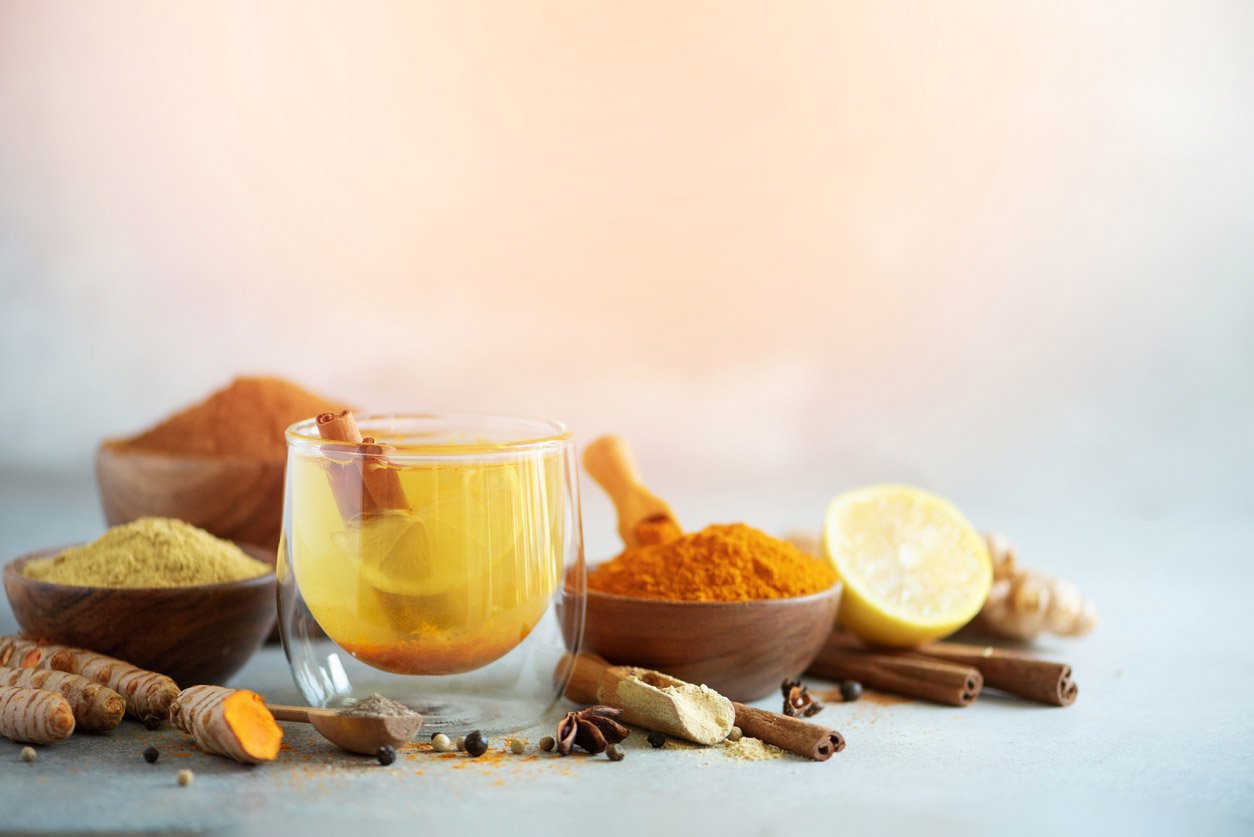
There are a number of herbs and spices that can benefit your immune system. These are easy to keep stocked in your kitchen and incorporate into a variety of meals and recipes. While they haven’t been tested on COVID-19 patients specifically, it stands to reason, based on their overall effect on immune health, they might be helpful.
Turmeric, an Indian spice known for its bright orange color, is rich in curcumin, a compound with known disease-fighting and antioxidant-rich characteristics. Turmeric can reduce inflammation, boost heart and brain health, and even prevent heavy metal toxicity. Add turmeric to rice dishes, soups, stews, and aromatic sauces.
Garlic and ginger have potent anti-inflammatory and immune-optimizing properties. As a side benefit, ginger can help settle your stomach and reduce the pain associated with migraines, while garlic may reduce cancer risk. You can incorporate both of these into stir-fries, casseroles, pasta dishes, and baked goods.
Cinnamon is full of polyphenols and antioxidants, and is a known anti-inflammatory, antidiabetic, antimicrobial, anticancer, and heart-healthy spice. You can add it to tea, baked goods, hot cocoa, coffee, and warm stir-fries.
Hot peppers contain a compound called capsaicin, which is not only responsible for their spiciness but also their remarkable benefits in bringing down excessive inflammation. Some studies indicate that eating hot peppers may even increase longevity.
Echinacea is one of the most powerful herbs for fighting off upper respiratory infections. Studies have shown that taking it at the earliest signs of the cold or flu can reduce the severity of illness. Extracts of echinacea can stimulate immune function, and may even be as effective as the flu drug without potential adverse side effects. The most common way to consume echinacea is as a tea or capsule.
Black Tea is rich in many polyphenols, including two, tannic acid and 3-isotheaflavin-3-gallate, which have been found to be inhibitive against the original SARS-CoV virus. While there have been no studies conducted as of this writing, with the use of black tea against SARS-CoV-2, it seems likely that it could be helpful. And if you want to steer clear of the caffeine, there are herbal teas — like ginger, thyme, sage, green, or rosehip — which have also been studied for their catechin and antioxidant content, and subsequent ability to shorten the severity and duration of cold and flu.
The Power of Your Plate
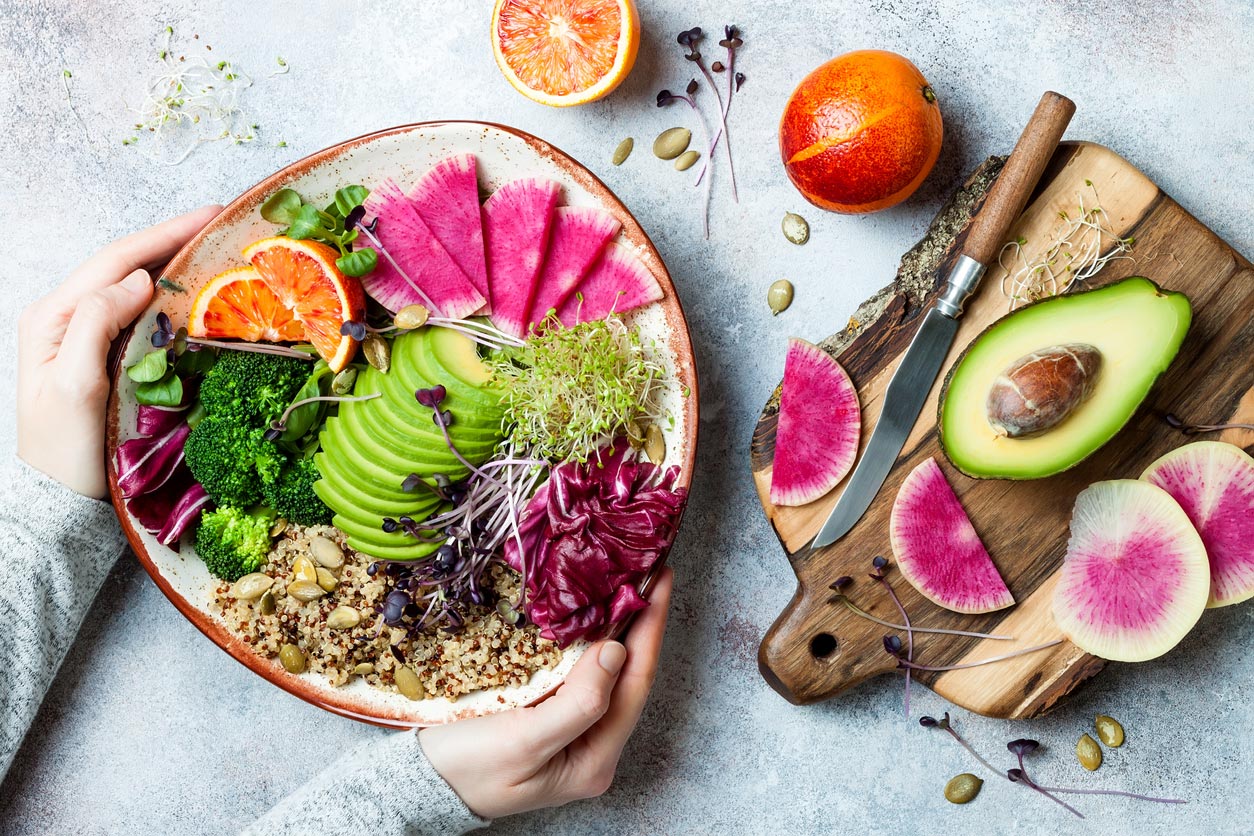
COVID-19 can land anyone in the hospital — even children. But in general, the people with the highest level of risk, tend to be older populations and people with underlying chronic conditions such as obesity, heart disease, high blood pressure, asthma, and type 2 diabetes. All of these, even biological aging, are profoundly impacted by your diet and lifestyle choices.
The modern industrialized diet is rich in calories and poor in nutrients. And the modern American diet, in particular, is based around sugar, refined carbohydrates, and other processed foods, while also deriving 34% of calories from fat, namely factory-farmed meat, dairy, and eggs. Meanwhile, around 90% of Americans aren’t getting the recommended amount of fruits and vegetables.
Tens of thousands of studies, published in peer-reviewed medical journals, make it clear that we need to eat more fruits, vegetables, and other whole plant foods and less sugar, white flour, meat, dairy, and eggs.
If you eat the Standard American Diet, or anything akin to it, then chances are you’re at risk for, or already have, one of the underlying conditions that could make you more susceptible to complications from COVID-19. But the good news is, there are choices you can make that will slash your risk of chronic disease. And in the time of COVID-19, they’re more important than ever before.
These are crazy times we’re living in. And none of us can control what goes on in the world around us. But we do get some say in the choices we make. And those play a fundamental role in shaping our destiny.
Tell us in the comments:
- What are some of your favorite practices for strengthening your immunity?
- What are some things you do already to stay healthy?
- Do you have any other questions about improving your health prevention habits?
Featured Image: iStock.com/ArtistGNDphotography
